The Largest Selection of Wholesale Mediterranean and Middle Eastern Products in Miami
When it comes to trying new, exciting cuisine, few foods hit the spot like a deliciously fresh Mediterranean meal. However, we know that it can be very difficult to find authentic Mediterranean grocery wholesalers in Miami, FL. Having lived in metro Atlanta for years, we realized that our customers needed an easy way to find quality wholesale Middle Eastern and Mediterranean food in bulk. That is why we created Nazareth Grocery Mediterranean Market - to give everyone a chance to enjoy tasty, healthy food, desserts, and authentic Mediterranean gifts at wholesale prices.
Founded in 2009, Nazareth Grocery has become one of Miami's leading international wholesale grocery stores. We are very proud to serve our customers and do everything in our power to give them the largest selection of high-quality wholesale goods available.
If you're looking for the freshest, most delicious Middle Eastern wholesale products and ingredients, you will find them here at the best prices in the state. We encourage you to swing by our store in Marietta to see our selection for yourself. We think that you will be impressed!
The Nazareth Difference
At Nazareth Grocery Mediterranean Market, our mission is simple: bring you and your family the largest selection of wholesale Mediterranean products in Miami. When coupled with our helpful, friendly staff and authentic Middle Eastern atmosphere, it's easy to see why we are the top Middle Eastern grocery wholesaler in Miami, FL. We're proud to carry just about every kind of Mediterranean and Middle Eastern product that you can think of, from prepared meals and hookahs to fine seasonings and sweets. We're here for our customers and want each one of them to have a unique, one-of-a-kind experience when they shop with us.
Our loyal customers love our selection of the following wholesale foods and gifts:
 Fresh Breads
Fresh Breads Olives
Olives Hummus
Hummus Cheeses
Cheeses Sauces
Sauces Savory Foods
Savory Foods
 Desserts
Desserts Drinks
Drinks Hookahs
Hookahs Tobacco
Tobacco Gifts
Gifts Much More!
Much More!
- The Largest Selection of Wholesale Mediterranean
- The Nazareth Difference
- Most Popular Wholesale Mediterranean Foods
- Most Popular Wholesale Middle Eastern Foods
- Benefits of Eating a Mediterranean Diet
- Benefits of Eating a Mediterranean Diet Tips
- Why Buy Mediterranean and Middle Eastern Products Wholesale?
Our Service Areas
Most Popular Wholesale Mediterranean Foods
There is so much more to Mediterranean food than pizza and pasta. The perfect climate combined with delicious foods and amazing wine makes the Mediterranean incredibly irresistible. That's why our customers absolutely love to buy this kind of cuisine in bulk. Every country in this region has its own set of specialties and delicacies, each with its own flavors and styles of preparation.
Mediterranean countries include:
- France
- Greece
- Italy
- Turkey
- Syria
- Egypt
- Israel
- Libya
- Morocco
- Tunisia
- Spain
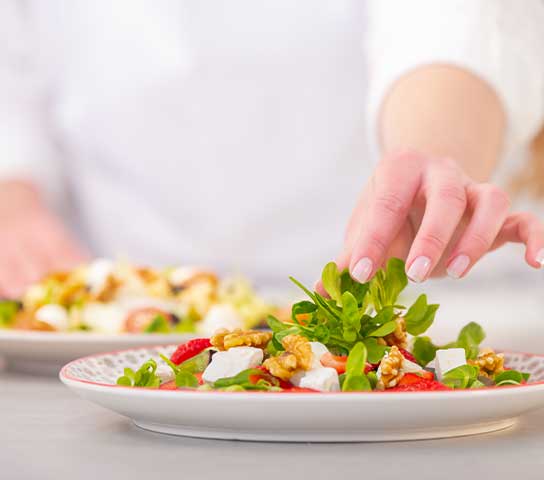
So, when it comes to the most popular wholesale Mediterranean products in Miami,
what are we talking about?
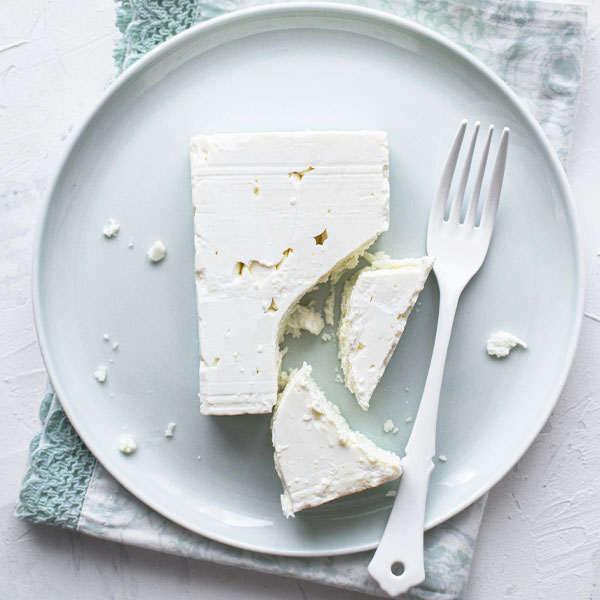
Feta Cheese
Feta cheese is a classic Mediterranean dairy product that is often enjoyed on its own, in Greek salads, on bread, or mixed with zucchini. Depending on where the feta is sourced and produced, the cheese can be made from cow, sheep, or goat milk, or even a combination of the three. Regardless of the animal it comes from, this delicious cheese is a crowd favorite.
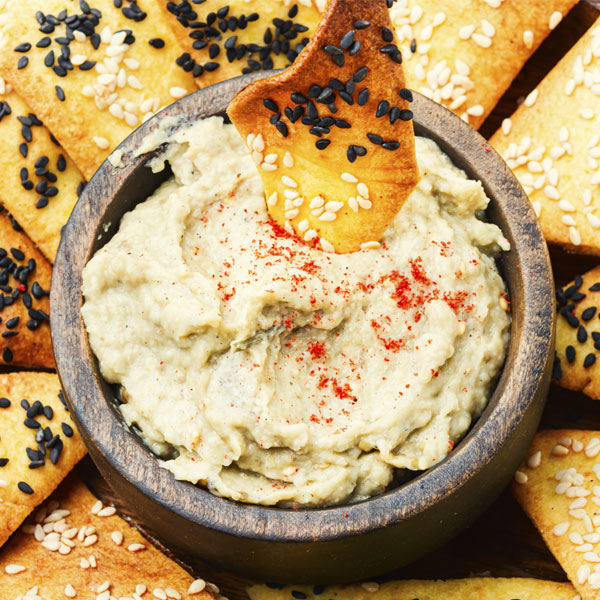
Baba Ganoush
This Levantine dish is one of the most well-known Mediterranean dishes to eat in the United States. It typically comes in the form of a dip, served with pita or another kind of dipping bread. Commonly served before dinner as an appetizer of sorts, it usually features tahini, eggplant, garlic, spices, and sometimes yogurt. This tasty cuisine works great as a spread on a sandwich, or you can even eat it with a spoon, all on its own.

Baklava
If you have never tried authentic baklava before, get ready to have your mind blown. This dessert is a traditional Mediterranean food that will have your taste buds craving more and more. Once you open a box of baklava from our Mediterranean grocery wholesaler in Miami, FL, you won't want to stop eating! Baklava is made with layers of thin filo dough, which is layered together, filled with chopped nuts (think pistachios), and sealed with honey or syrup. Baklava is so good that its origins are debated, leaving many wondering which country invented the dessert. Everyone from the Turks to the Greeks and even Middle Easterners hold unique takes on baklava. Try each one to discover your favorite!
Most Popular Wholesale Middle Eastern Foods
Fresh, healthy, aromatic, rich: it's no wonder that the popularity of Middle Eastern cuisine and products has skyrocketed in the United States. This genre of cuisine features a large variety of foods, from Halvah to Labneh. If there were one common theme throughout all Middle Eastern food, it would be the bright, vibrant herbs and spices that are used. These flavorings help create rich, complex flavors that foodies fawn over. Typically, Middle Eastern food is piled high for all to eat, with enough food for an entire republic to put down.
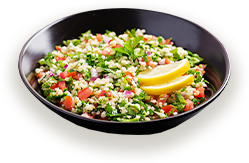
Tabbouleh
This refreshing, healthy dish is chock-full of greens, herbs, tomatoes, and bulgur (or cracked wheat), creating a memorable, bold flavor. This dish may be eaten on its own or paired with a shawarma sandwich or helping of falafel. It's best to buy your ingredients in bulk to make this dish because it tastes best freshly made with family around to enjoy. Just be sure to bring a toothpick to the tabbouleh party - you're almost certain to have some leafy greens stuck in your teeth after eating.
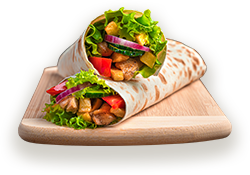
Shawarma
We mentioned shawarma above, and for good reason - this dish is enjoyed by men and women around the world, and of course, right here in the U.S. Except for falafel, this might be the most popular Middle Eastern food item in history. Shawarma is kind of like a Greek gyro, with slow-roasted meat stuffed in laffa with veggies and sauce. The blend of spices and the smoky meat mix together to create a tangy, meaty flavor that you will want to keep eating for hours. For western-style shawarma, try using beef or chicken. For a more traditional meal, try using lamb from our Middle Eastern grocery distributor in Miami, FL.

Hummus
Traditionally used as a dip meant for fresh pita, hummus is a combo of chickpeas, garlic, and tahini, blended together until silky, smooth, and creamy. You can find hummus in just about any appetizer section of a Middle Eastern restaurant menu. That's because it's considered a staple of Middle Eastern food that can be enjoyed by itself, as a spread, or with fresh-baked pita bread. Hummus is also very healthy, making it a no-brainer purchase from our grocery store.
Benefits of Eating a Mediterranean Diet
If there's one diet that is most well-known for its health benefits, it has got to be the Mediterranean diet. In 2019, U.S. News & World Report listed the Mediterranean diet as No. 1 on its best over diet list. This incredible diet has been cited to help with weight loss, brain health, heart health, diabetes prevention, and cancer prevention.
Whether you already love Mediterranean food or you're looking to make some positive changes in your life, this "diet" is for you. Eating cuisine like Greek food, Persian food, Turkish food, and Italian food is healthy and tastes great. Even better than that? At Nazareth Wholesale Grocery, we have many staples of the Mediterranean diet for sale in bulk so that you can stock up on your favorites at the best prices around.
So, what exactly is the Mediterranean diet?
It is a way of eating that incorporates traditional Greek, Italian, and other Mediterranean cultures' foods. These foods are often plant-based and make up the foundation of the diet, along with olive oil. Fish, seafood, dairy, and poultry are also included in moderation. Red meat and sweets are only eaten in moderation, not in abundance. Mediterranean food includes many forms of nuts, fruits, vegetables, fish, seeds, and more. Of course, you can find at them all at our wholesale Mediterranean grocery store!
Here are just a few of the many benefits of eating a healthy Mediterranean diet:

Reduced Risk
of Heart Disease
Many studies have been conducted on this diet, many of which report that Mediterranean food is excellent for your heart. Some of the most promising evidence comes from a randomized clinical trial published in 2013. For about five years, researchers followed 7,000 men and women around the country of Spain. These people had type 2 diabetes or were at a high risk for cardiovascular disease. Participants in the study who ate an unrestricted Mediterranean diet with nuts and extra-virgin olive oil were shown to have a 30% lower risk of heart events.

Reduced Risk
of Stroke for Women
In addition to the heart-healthy benefits of a Mediterranean diet, studies have shown that eating healthy Mediterranean and Middle Eastern foods can reduce the chances of stroke in women. The study was conducted in the U.K., which included women between the ages of 40 and 77. Women who stuck to the Mediterranean diet showed a lower risk of having a stroke - especially women who were at high risk of having one.
Benefits of Eating a Mediterranean Diet
First and foremost, purchase your Mediterranean and Middle Eastern wholesale foods from Nazareth Grocery - we're always updating our inventory! Getting started on this healthy, delicious diet is easy.
Try these tips:

1.
Instead of unhealthy sweets like candy and ice cream, try eating fresh fruit instead. It's refreshing, tasty, and often packed with great vitamins and nutrients.
2.
Try eating fish twice a week, in lieu of red meat. Fish is much healthier and doesn't have the unfortunate side effects of red meat, like inflammation.
3.
Try planning out your meals using beans, whole grains, and veggies. Don't start with meats and sweets.
4.
They're tasty, but try to avoid processed foods completely.
5.
Instead of using butter to flavor your food, use extra virgin olive oil instead. Olive oil contains healthy fats and tastes great too.
6.
Try to get more exercise and get out of the house. The Mediterranean lifestyle is an active one, best enjoyed in the beautiful sunshine when possible.
Why Buy Mediterranean and Middle Eastern Products Wholesale?
Buying wholesale and retail are quite different. When you buy products from a wholesaler, you're essentially buying from the middleman between a retail establishment and the manufacturer. Wholesale purchases are almost always made in bulk. Because of that, buyers pay a discounted price. That's great for normal buyers and great for business owners, who can sell those products to profit. This higher price is called the retail price, and it is what traditional customers pay when they enter a retail store.
Free Estimate
Latest News in Miami, FL
Here Are All the Michelin-Starred Restaurants in Miami for 2024
Olee Fowlerhttps://miami.eater.com/2024/4/18/24134470/michelin-miami-winners-guide-2024
The Michelin dining guide has officially announced its award winners for the third edition of its Florida Michelin Guide. Like previous two years, the list of places that took home the coveted star awards are comprised predominately of expensive, upscale, Eurocentric South Florida restaurants. Related ...
The Michelin dining guide has officially announced its award winners for the third edition of its Florida Michelin Guide. Like previous two years, the list of places that took home the coveted star awards are comprised predominately of expensive, upscale, Eurocentric South Florida restaurants.
The guide is seen by many as the global standard of restaurant reviews with its up to three-star rating system with one-star considered “very good restaurant in its category,” two-star considered “worthy of a detour,” and three-star deemed a “special journey.” There is also the Bib Gourmand status, an unstarred category given to high-caliber restaurants that serve a two-course meal for around $50 a person.
Miami restaurants dominated the awards again for a third year in a row, receiving the most in the state. New one-star winners in Miami EntreNos, Ogawa, and Shingo. The Miami outpost of L’Atelier de Joël Robuchon maintained its two-star status for a third year in a row and still the only sole two-starred restaurant in the Sunshine State.
Ten one-star winners from 2023 retained their one-star status, including:
Miami also had 18 restaurants receive a Bib Gourmand award including two new recipients. Returning to the Bib Gourmand list this year are Bachour, Chug’s Diner, Doya, El Turco, Ghee Indian Kitchen, Hometown Barbecue, La Natural, Lucali, Mandolin, Michael’s Genuine Food & Drink, Phuc Yea, Sanguich de Miami, Tinta y Cafe, Zak the Baker, Zitz Sum, Jaguar Sun, and Rosie’s. One new recipient, Tam Tam, was announced last week.
Not returning to the list this year are The Den at Sushi Azabu, omakase in Miami Beach, which previous held a one-star ranking and Lung Yai, which held a Bib.
The annual guide began as a free booklet in 1900 published by Michelin (yes, of tire fame) to help motorists find the best places to eat and drink throughout Europe. Over the past century, it has grown in prestige and expanded its footprint globally.
This Michelin Guide partners with Visit Florida, the state’s official tourism board, for the Sunshine State’s guide. The Michelin Guide doesn’t disclose how much it is paid to bring inspectors to those markets — price tags for the state have been reported to be well over seven figures, with Miami-Dade County paying $116,000 a year over three years to help offset the cost of producing of the guide — though the company has been candid in the past about its partnerships with those respective boards.
But not all chefs welcome the stars. Over the years, chefs have famously asked to “give back” their stars, citing the increased pressures that the award brings, especially for those awarded the much-coveted three-star recognition. Others have pointed out the guide's penchant for selecting primarily European and Japanese menus for stars at the expense of other worthy cuisines and cultural institutions like street food.
Stubborn Seed
101 Washington Avenue, , FL 33139 (786) 322-5211 Visit Website
Ariete
3540 Main Highway, , FL 33133 (786) 615-3747 Visit Website
Azabu Miami Beach
161 Ocean Drive, , FL 33139 (786) 276-0520 Visit Website
Elcielo By Juan Manuel Barrientos
31 Southeast 5th Street, , FL 33131 (305) 755-8840 Visit Website
Los Felix Taquería
3413 Main Hwy, Miami, FL 33133
COTE Miami
3900 Northeast 2nd Avenue, , FL 33137 (305) 434-4668 Visit Website
The Surf Club Restaurant
9011 Collins Avenue, , FL 33154 (305) 768-9440 Visit Website
Boia De
5205 Northeast 2nd Avenue, , FL 33137 (305) 967-8866 Visit Website
L’Atelier de Joël Robuchon
4100 Northeast 2nd Avenue, , FL 33137 Visit Website
Hiden
313 Northwest 25th Street, , FL 33127 Visit Website
Cannabis cocktails at the club? How the marijuana industry may change in Florida
Michelle Marchantehttps://www.miamiherald.com/news/local/marijuana/article287758745.html
What’s the future of marijuana in Florida?First, a ballot issue in November that will ask voters whether they want to legalize recreational use.Then there is the business.Cannabis company CEOs say they’re preparing for increased demand for cannabis products and accessories if recreational pot is legalized. Giving the OK to recreational weed could also boost the hospitality industry in South Florida by cashing in on cannabis.Cannabis beer on tap? Edibles instead of after-dinner mints?In some stat...
What’s the future of marijuana in Florida?
First, a ballot issue in November that will ask voters whether they want to legalize recreational use.
Then there is the business.
Cannabis company CEOs say they’re preparing for increased demand for cannabis products and accessories if recreational pot is legalized. Giving the OK to recreational weed could also boost the hospitality industry in South Florida by cashing in on cannabis.
Cannabis beer on tap? Edibles instead of after-dinner mints?
In some states where recreational marijuana is already legal, restaurants can apply for a “social consumption lounge license,” which lets customers consume marijuana on site.
While Florida isn’t considering that yet, it’s something cannabis entrepreneurs think could happen in the future if voters approve Amendment 3 in November.
Florida has a strong and growing $2 billion medical marijuana market with lots of opportunity for growth, especially if weed becomes available to all adults, according to Florida-based Sunburn Cannabis CEO Brady Cobb. State data shows there are more than 878,000 medical marijuana card holders alone.
But “the devil is in the details,” said Cobb, noting that the Florida Legislature would likely restrict where and how people can use recreational pot if the measure passes. Medical marijuana, for example, while legal in the state, is prohibited in public.
Cobb was one of hundreds of entrepreneurs and industry leaders who gathered at the Diplomat Beach Resort in Hollywood this week, leading up to Saturday’s 4/20 cannabis culture day, to talk all things weed at the Benzinga Cannabis Capital Conference. Exhibitors showcased vapes, rolling papers and non-alcoholic hemp-derived THC beers and sodas, which have been growing in popularity and are available at some licensed stores including Total Wine & More.
THC is the substance that makes you feel high when you smoke marijuana or eat an edible. “While there are many forms of THC, the THC extracted from hemp is the same as the THC extracted from the marijuana plant, and they have the same intoxicating effects,” according to the Minnesota Department of Health.
READ MORE: What happens if Florida legalizes recreational marijuana? Where could you buy and smoke?
THC beverages can give the same effects as edibles, but quicker, and are a product that could help change the perception people have of cannabis, said Diana Eberlein, chair of the Cannabis Beverage Association.
The target consumer for these low-dose drinks are the “canni-curious,” who have never tried or have rarely used cannabis products before, said Aaron Nosbisch, founder and CEO of BR?Z, a cannabis-infused beverage company.
While some licensed dispensaries might sell THC beverages, hemp-derived THC beverages can be found at licensed liquor and alcohol retailers, though drink availability varies by state, said Mark Flores, the marketing director forFlorida-based Rexis Biotech, which unveiled its new non-alcoholic hemp-derived THC drink Squared at the conference. The drink will be available in Florida online and in select retailers in the next few weeks.
Currently, non-alcoholic hemp-derived THC beverages are legal in Florida, though that could soon change if Gov. Ron DeSantis signs HB 1613 into law, according to Dustin Robinson, founding partner of Mr. Cannabis Law, a firm with offices in Fort Lauderdale, New York, California and Maryland, and co-founder of nonprofit Mr. Psychedelic Law, which is advocating for legal psychedelic reform in Florida.
The bill, if signed by the governor, would ban hemp-derived THC beverages in Florida, just like how marijuana-derived THC beverages are currently banned, he said. Hemp and marijuana come from the same plant species, but THC levels differ. Hemp is legal under federal and state law because it contains 0.3 percent or less THC.
The law would set more rigorous THC caps on hemp-extract products, which would also affect “full-spectrum CBD products” and strengthen restrictions on how edible hemp products are packaged, according to Florida Politics.
CBD, or Cannabidiol, is an ingredient found in cannabis, but it doesn’t cause a high by itself, according to the U.S. Centers for Disease Control and Prevention. Currently, people 18 and older in Florida are allowed to buy CBD products, including oils and topicals, from authorized sellers if the product has 0.3% or less of THC and was extracted from the hemp plant.
Under the bill, Florida businesses would be prohibited from “manufacturing or selling products that contain more than 0.3 percent delta-9 and place limits on other cannabinoids,” according to Health News Florida. Critics say the measure is driven by medical marijuana operators that want less competition if recreational marijuana is approved, according to Health News Florida.
For the growing THC beverage market, it’s not just regulations that will define its future success, according to Rachel Burkons, a cannabis hospitality entrepreneur who is the chair of the Food and Beverage Committee for the Cannabis Hospitality Coalition.
The industry also needs to hone in on educating customers on how to safely enjoy their products, she said.
“Consumers know what to expect from a glass of wine. They know tequila might make them a little crazy and that gin gives them a hangover,” Burkons said. “So how do we train them to understand where THC beverages fit within their own personal consumption?”
Here is where marijuana laws stand in each state. Hover over the state to learn more.
This story was originally published April 19, 2024, 7:21 AM.
Michelle Marchante covers the pulse of healthcare in South Florida. Before that, she covered the COVID-19 pandemic, hurricanes, crime, education, entertainment and other topics in South Florida for the Herald as a breaking news reporter. She recently won second place in the 73rd annual Green Eyeshade Awards for her consumer-focused healthcare stories and was part of the team of reporters who won a 2022 Pulitzer Prize For Breaking News in the Herald’s coverage of the Surfside condo collapse. Michelle graduated with honors from Florida International University and was a 2020-2021 Poynter-Koch Media & Journalism fellow.
Three Miami restaurants just earned Michelin stars — but one local spot got bumped
Connie Oglehttps://www.miamiherald.com/miami-com/restaurants/article287766575.html
At the 2024 Michelin Guide ceremony Thursday night at The Tampa Edition hotel, three more Miami-area restaurants earned Michelin stars.The newly starred restaurants are the contemporary American spot EntreNos in Miami Shores, which operates four nights a week after hours inside Tinta y Cafe; and two Japanese restaurants, ...
At the 2024 Michelin Guide ceremony Thursday night at The Tampa Edition hotel, three more Miami-area restaurants earned Michelin stars.
The newly starred restaurants are the contemporary American spot EntreNos in Miami Shores, which operates four nights a week after hours inside Tinta y Cafe; and two Japanese restaurants, Ogawa in Little River and Shingo in Coral Gables. Each restaurant earned a star; Florida’s only two-star Michelin restaurant remains the luxurious French spot L’Atelier de Joël Robuchon in the Design District.
Read Next
April 18, 2024 8:32 PM
L’Atelier and 10 of the one-star restaurants in Miami — Ariete, Boia De, Cote, Elcielo, Hiden, Le Jardinier, Los Felix, Stubborn Seed, The Surf Club Restaurant and the Tambourine Room by Tristan Brandt — retained their stars. The Den at Azabu did not but will remain as a recommended restaurant in the guide.
All but one of the local Bib Gourmands, a designation that indicates a restaurant offers quality food for good value, kept their ratings as well. Lung Yai Thai Tapas in Little Havana lost its Bib Gourmand designation but like The Den will remain a recommended restaurant.
Last week, Vietnamese restaurant Tam Tam was announced as Miami’s only 2024 addition to the Bib Gourmand list, joining Bachour, Chug’s Diner, Doya, El Turco, Ghee Indian Kitchen, Hometown Barbecue, Jaguar Sun, La Natural, Lucali, Mandolin, Michael’s Genuine, Phuc Yea, Rosie’s, Sanguich de Miami, Tinta y Cafe, Zak the Baker, and Zitz Sum.
Here’s what the guide had to say about the three newly starred spots:
Read Next
February 23, 2024 4:30 AM
EntreNos: The restaurant from Chefs Evan Burgess and Osmel Gonzalez, veterans of Michael Beltran’s Michelin-starred Ariete, focuses on sourcing as much as possible from Florida. The chefs estimate at least 80 percent of the menu comes from the state.
Burgess recently told the Miami Herald that he and Gonzalez believe supporting local producers is crucial to their mission.
“So many farmers have been gracious to us and supported our business, we want to support them,” he said. “The only way to ensure the good guys stay there in Homestead is to support them. . . . it’s the same with fishermen. If you don’t support local fishermen you see truckloads of spiny lobster going to China. Not that China shouldn’t get our products, but we want to make sure a lot of that stuff stays here.”
Michelin praised the “eclectic space” at EntreNos and the dining counter that gives diners a great view of the open kitchen.
“High-quality ingredients meet serious skill here,” the guide says. “The smoked dry-aged cobia is a perfect example of what this place does so well. Dry-aged for one week in-house, then smoked and finished over the grill, it’s served with a Moujean tea beurre blanc sauce. Pumpkin flan is churned into ice cream and topped with pepita granola and coffee espumita for a dessert that is as unexpected as it is delightful.”
Ogawa: Michelin continues its love affair with high-end omakase restaurants with the addition of Ogawa. This omakase-only spot from Venezuelan restaurateur and art dealer Alvaro Perez Miranda, who also owns the Miami restaurants Hiyakawa, Wabi Sabi and Midorie, is led by chef and co-owner Masayuki Komatsu, who was executive chef at Hiyakawa since 2020.
“From baby sea eels with a soy-cured quail egg and bigfin reef squid in a shiso-miso sauce to baby snow crab and Japanese-style herring roe, this appetizer of four bites is the first sign that this isn’t your typical sushi counter,” the guide says. “Then, lotus root, wild yam and langoustine tempura is sided by a thick sauce made from roasted langoustine shells.” The guide also praised Ogawa’s nigiri, squid topped with Osetra caviar and anago (salt water eel) with sansho pepper.”
Shingo: Led by chef and owner Shingo Akikuni, formerly executive chef at the Michelin-starred Hiden in Wynwood, this intimate restaurant in the historic La Palma building features a gorgeous 14-seat counter made of rare Hinoki wood.
“Fish is sourced almost entirely from Japan, sliced in uniform fashion, and dressed with little more than a swipe of nikiri,” says the guide, which also praised the chef’s graciousness. “They keep a close eye on the seasons, too, evidenced by a recent special of high-grade tuna from Aomori prefecture and an indulgent chawanmushi (Japanese egg custard) with matsutake (a mushroom).”
Two local chefs were also honored with special awards at the Tampa ceremony. Gabriela Ospina of the starred Boia De in Little Haiti won the Michelin Sommelier Award, and Tam Pham of Tam Tam in Miami won the Michelin Young Chef Award.
For the first time this year, Michelin added two Green Star restaurants to the guide, which highlight restaurants that show commitment to sustainability. Los Felix/Krus Kitchen in Coconut Grove earned the honor for eliminating seed oils, partnering with a local farmer, sourcing fish from a local supplier and using grass fed meats, lamb and heritage pork. Orlando’s Filipino restaurant Kaya also earned a Green Star.
Four restaurants in Orlando and two in Tampa also were awarded stars, bringing the total of Florida stars to 26. One Orlando restaurant, Knife & Spoon, did not retain its stars.
This year marks the third year of a three-year deal Michelin made with state tourism and marketing agency Visit Florida and tourism agencies in Miami, Orlando and Tampa, which paid the guide an estimated $1.5 million for Michelin to rate and highlight restaurants in the three cities from 2022-2024.
In a statement, Michelin indicated that a continuation of the partnership is likely.
“Michelin cannot discuss the terms of its relationships for competitive reasons, although Michelin respects that partners might have disclosure agreements,” the statement said. “It’s worth mentioning that once the Guide arrives in a destination the intent is for it to remain there. Supported by partnerships, the inspectors will continue to evaluate restaurants in the current coverage areas while keeping an eye on other locales as possible culinary hot spots for inclusion.”
EntreNos: 9840 NE Second Ave., Miami Shores; www.entrenosmiami.com
Ogawa: 7223 NW Second Ave., Miami; www.ogawamiami.com
Shingo: 112 Alhambra Circle, Coral Gables; www.shingomiami.com
A new real estate trend? Shopping malls converted into residential units in South Florida
Sophia Hernandezhttps://www.nbcmiami.com/news/local/a-new-real-estate-trend-shopping-malls-converted-into-residential-units-in-south-florida/3277397/
Miami’s housing inventory remains around 37% below our regions historical average, according to a March report by Norada Real Estate Investments.Simply put- we don’t have enough houses.So how do we create more living space to meet demand? A new solution has been in the works across Miami-Dade County and it starts with shopping malls!Off of South Dixie Highway and Red Road, is Sunset Place. Since it opened in 1999, it was known as a bustling mall offering food, dining and fun.But now, it’s desolat...
Miami’s housing inventory remains around 37% below our regions historical average, according to a March report by Norada Real Estate Investments.
Simply put- we don’t have enough houses.
So how do we create more living space to meet demand? A new solution has been in the works across Miami-Dade County and it starts with shopping malls!
Off of South Dixie Highway and Red Road, is Sunset Place. Since it opened in 1999, it was known as a bustling mall offering food, dining and fun.
But now, it’s desolate. A virtually empty building with no foot traffic.
“It’s no longer that we are going to depend on just retail outlets to bring people, we need more things to come to the community,” said realtor Bryan Gorrita.
Gorrita has worked in the real estate industry for five years with over 20,000 followers on Instagram, and shares his insight on all new real estate ventures and changes happening in Miami.
He’s been staying up to date on all the latest shopping mall redevelopments, including this one.
“From my understanding, they are still working out and fine tuning what the overall plan will look like. The local government has made it clear they want to redevelop this. It’s currently an eyesore and there’s so much potential.”
Midtown Equities are the developers of the project. NBC6 attempted to reach out to them multiple times, but have not heard back via phone or email at the time of this report.
But information on what the project could look like is still in the works.
The City of South Miami says they are waiting on the developers to submit their plans to the city, but they are anticipating mixed use, residential and food and beverage offerings. Meaning, that the project will have units incorporated into the site.
Going south to Cutler Bay there’s another project.
Southland Mall is already being redeveloped into Southplace City Center.
According to the town of Cutler Bay's website, what’s now a construction site will soon be converted into 4,000 residential units, 500,000 square feet of retail, 150,000 square feet of food and beverage options, a 150-key hotel, 60,000 square feet of medical office space and an amphitheater.
The site should be completed by 2029 with the first rental properties being available in early 2025, creating roughly 2,700 new jobs.
The town of Cutler Bay reached out to NBC6 after the piece aired to provide updated numbers. As of April, the project will have 5,000 units. They furthered that they do not have a new completion date. While they anticipated groundbreaking on the first residential building last year, they do not have a revised timeline for when a groundbreaking will take place.
“If you are a resident living down south, why do you have to drive hours and hours to Brickell or Wynwood when you could have those same high-quality amenities and attractions right in your own location,” said Gorrita
This move from sole retail spaces to mixed-use buildings is expected to be the future.
“This is happening because there’s a huge demand for this. People want to work, live, and play all in the same place. And they want to make it so that the communities involved,” Gorrita explained.
According to Forbes, the Urban Land Institute and National Multifamily Housing Council Research Foundation estimates that there is 1 billion square feet of obsolete retail in the US.
In an analysis done by JLL of 135 mall redevelopment projects in the country, over 50% include housing. But these shopping malls aren’t just becoming residential spaces, 85% of the projects in the analysis will retain retail on site.
Why could a mall flip be a good move?
“A lot of those shopping malls are in high traffic areas and they are in demand. so they are well located,” said Dr. Eli Beracha, Director of Hollo’s School of Real Estate at Florida International University.
He explained that because of the rise of online shopping, brick and mortar malls will soon become fewer and fewer. While the empty lots might be considered for mixed-use space because of their prime location, putting the idea into action isn’t that simple.
“You have to remember that this is not that we are taking the space, and we are changing the inside. In a lot of cases, you are knocking the space and you are rebuilding from zero. It’s extremely, extremely difficult to convert a shopping mall into residential space just by altering space,” Beracha said.
“Same thing with office space, the configuration, the way electricity flows, water sewage etc. It’s just not suitable for real estate in its current state. So, in many cases you need a complete rebuild, it’s not an alteration,” he added.
The site plans for these projects are trying to incentivize Miami residents by promising a ‘mini city’ or ‘destination’, phrases that advertise a mini metropolis that is just steps away.
Some sites like Palms at Town and Country are doing just that.
They recently announced they are turning the Kohls building into 12 story apartment buildings.
“For now, in order to meet the community needs, we are going to have to go up,” said Gorrita.
“And that is the only option right now especially for a city that is growing. Is this a bad thing or a good thing? I don’t think it is bad or good, I just think this is the new iteration that Miami is destined to become and we have to be prepared for it.”
Gorrita explains that lack of housing has been a continuous issue in Miami-Dade County and malls might be the only creative solution to use land we already have.
“Unfortunately, Miami has an issue when it comes to the availability of land, where we are pretty much land locked. To the West we have the Everglades, the East is the beach, and to the South is the Keys and there’s not enough available real estate for people to develop, and that’s why you are seeing malls like this that become habitats to sustain populations and they become work centers and living centers and just everything.”
The big question is how much will these rental units and apartments be?
“You got to put yourself in the shoes of the developer. If you are buying in a high price area, you need to make a margin, you need to make you ROY back. In those areas you are still going to see high price luxury rental units that are going to come,” he states.
Gorrita explains, “Of course, there are incentives like the Live Local Act that allows developers and local leaders to rezone industrial areas, malls, so you can increase density and create more workforce housing and affordable housing for residents. But unfortunately, from what I have been seeing here, we are going to see a lot more rental communities, and a lot of these are going to be for rent.”
Lessons On ‘Evils Of Communism’ Required In FL Schools Under New Law
Miami, FL Patchhttps://patch.com/florida/miami/lessons-evils-communism-required-fl-schools-under-new-law
All Florida students, even kindergarteners, are required to learn about communist history and tactics under a new law.Tiffany Razzano, Patch StaffPosted Thu, Apr 18, 2024 at 11:07 am ET|FLORIDA — A new Florida law requires lessons “on the dangers and evils of communism” for all students, according to a news release from Gov. Ron DeSantis’ officer.The governor signed the education bill,...
All Florida students, even kindergarteners, are required to learn about communist history and tactics under a new law.
Tiffany Razzano, Patch Staff
Posted Thu, Apr 18, 2024 at 11:07 am ET|
FLORIDA — A new Florida law requires lessons “on the dangers and evils of communism” for all students, according to a news release from Gov. Ron DeSantis’ officer.
The governor signed the education bill, Senate Bill 1264, into law Tuesday in Hialeah Gardens to coincide with the 63rd anniversary of the Bay of Pigs, he said. The 1961 invasion of Cuba was a failed attempt by U.S.-backed Cuban exiles to overthrow the communist government of Fidel Castro, according to the John F. Kennedy Presidential Library and Museum.
“The truth will set us free,” DeSantis said in a statement. “We will not allow our students to live in ignorance, nor be indoctrinated by communist apologists in schools. To the contrary, we will ensure students in Florida are taught the truth about the evils and dangers of communism.”
The new law requires age-appropriate history lessons for students in kindergarten through 12th grade to include instruction on the history of communism in the U.S. and the tactics of communist movements. The goal is to prepare students “to withstand indoctrination on communism at colleges and universities,” the governor's office said.
Additionally, the law allows for the creation of the Institute for Freedom in the Americas at Miami Dade College. The institute will “promote the importance of economic and individual freedoms as a means to advance human progress — specifically in Latin America and the Caribbean” and partner with the Adam Smith Center for Economic Freedom at Florida International University, according to DeSantis’ office.
Find out what's happening in Miamiwith free, real-time updates from Patch.
The law also enables the Florida Department of State, working with the Florida Department of Education, to recommend the creation of a Florida-based museum on the history of communism to the state legislature.
“It is vitally important that every student learns about the dangers of communism,” Florida Education Commissioner Manny Diaz, Jr. said. “I know firsthand the evils that communism brings, and I am proud to stand by Governor DeSantis as he signs this legislation to ensure Florida remains the bastion of freedom.”
Get more local news delivered straight to your inbox. Sign up for free Patch newsletters and alerts.
Disclaimer:


 770-795-9026
770-795-9026


